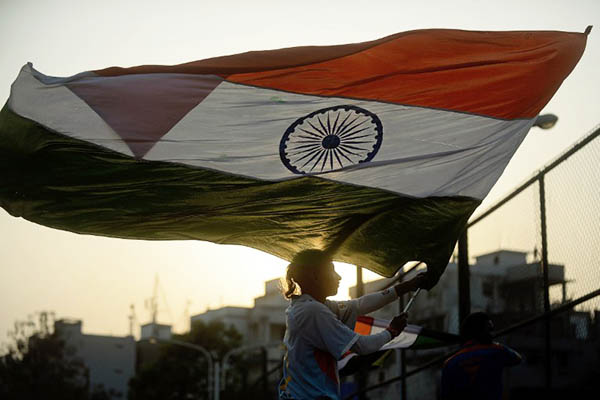
Punit Paranjpe—AFP
Arundhati Roy offers a glimpse into her native India
Arundhati Roy has written her second novel, The Ministry of Utmost Happiness, after a gap of 20 years, and it starts symbolically with Muslim transgender Anjum, a scion of Genghis Khan born in the family of hakims who conquered South Asia by inventing sherbet Rooh-Afza. Anjum pays a Hindu surgeon his last penny to become a girl but goes through a life-changing trauma when, during a wet dream, he still gets his male orgasm. Here are some excerpts from Roy’s critique of India, which will likely hurt many in India without pleasing many in Pakistan.
Atal Bihari Vajpayee: “The Poet-Prime Minister of the country and several of his senior ministers were members of an old organization that believed India was essentially a Hindu nation and that, just as Pakistan had declared itself an Islamic Republic, India should declare itself a Hindu one. Some of its supporters and ideologues openly admired Hitler and compared the Muslims of India to the Jews of Germany. Now, suddenly, as hostility towards Muslims grew, it began to seem to the Organization that the whole world was on its side.”
Narendra Modi: “The Chief Minister of Gujarat, a loyal member of the Organization (as were the Home Minister and the Prime Minister), was, at the time, up for re-election. He appeared on TV in a saffron kurta with a slash of vermilion on his forehead, with cold, dead eyes. The killing went on for weeks and was not confined to cities alone. The mobs were armed with swords and tridents and wore saffron headbands. They had cadastral lists of Muslim homes, businesses and shops. They had stockpiles of gas cylinders (which seemed to explain the gas shortage of the previous few weeks). When people who had been injured were taken to hospital, mobs attacked the hospitals. The police would not register murder cases. They said, quite reasonably, that they needed to see the corpses. The catch was that the police were often part of the mobs, and once the mobs had finished their business, the corpses no longer resembled corpses.”
Anna Hazare: “In his interviews he smiled his gummy Farex-baby smile and described the joys of his simple, celibate life in his room that was attached to the village temple, and explained how the Gandhian practice of rati sadhana—semen retention—had helped him to keep up his strength during his fast. To demonstrate this, on the third day of his fast, he got off his bed, jogged around the stage in his white kurta and dhoti and flexed his flappy biceps. People laughed and cried and brought their children to him to be blessed.”
Kashmir: “The inbuilt idiocy, this idea of jihad, has seeped into Kashmir from Pakistan and Afghanistan. Now, 25 years down the line, I think, to our advantage, we have eight or nine versions of the ‘True’ Islam battling it out in Kashmir. Each has its own stable of Mullahs and Maulanas. Some of the most radical among them—those who preach against the idea of nationalism and in favor of the great Islamic Ummah—are actually on our payroll. One of them was recently blown up outside his mosque by a bicycle bomb. He won’t be hard to replace. The only thing that keeps Kashmir from self-destructing like Pakistan and Afghanistan is good old petit bourgeois capitalism. For all their religiosity, Kashmiris are great businessmen. And all businessmen eventually, one way or another, have a stake in the status quo—or what we call the ‘Peace Process’, which, by the way, is an entirely different kind of business opportunity from peace itself.”
